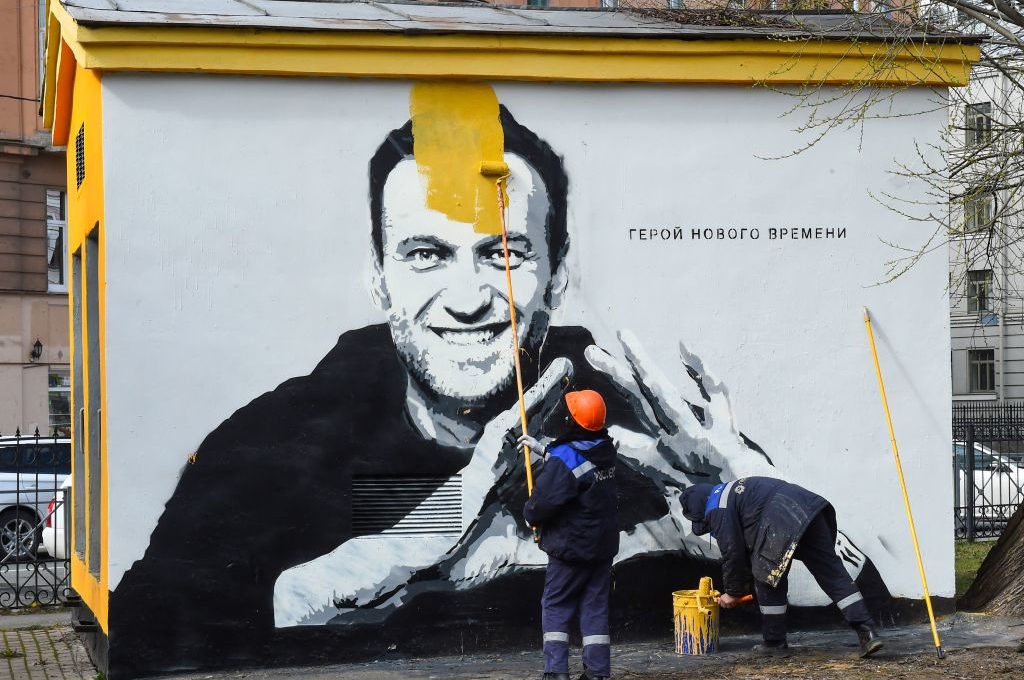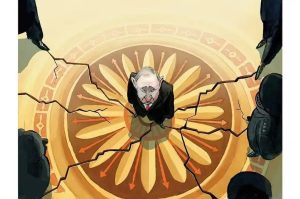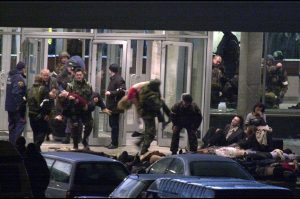Alexei Navalny seems to undergoing a metamorphosis. Yesterday, we saw him attending another trial by video, looking gaunt after 24 days of hunger strike. But if anything, the more attenuated his frame, the more his moral certainty shone through it.
An appeals hearing for a separate charge of insulting a World War Two veteran gave him a rare opportunity to speak to the outside world. Characteristically, he made a joke of his condition to his wife, Yulia, saying he now looked like ‘a creepy skeleton’.
However, this was a moment’s light-hearted intimacy in a bravura performance primarily directed towards both the Kremlin and the wider Russian population. Just as Vladimir Putin appears unable to refer to Navalny by name — instead using such formulations as ‘the blogger’ or ‘the man in question’ — so too the opposition leader chose not to refer to the president directly. Instead, he delivered a blistering critique of ‘the king without clothes,’ whose ‘20 years of mediocre rule’ has left Russia backward and degraded.
He continued that ‘your thieving, naked king wants to continue to rule, to the very end. He doesn’t give a damn about the country at all. He grabbed her and wants to hold onto this power indefinitely. But if he continues to reign, the lost decade will be replaced by a stolen decade.’
In this, he was speaking to the widespread discontent in the country, after years of stagnant or declining standards of living. The mass protests which greeted Navalny’s arrest on his return to Russia were, after all, less about him and more an expression of a ‘coalition of the fed-up’. This was made up of those with all kinds of different reasons to feel unhappy with the status quo, whom Navalny gave an excuse and an opportunity to make their frustrations known.
The Kremlin had orchestrated this additional trial, accusing him of slandering a 93-year-old war veteran, precisely as a gambit to portray Navalny as an unpatriotic boor. World War Two — the Great Patriotic War to the Russians — is after all still a source of pride verging on reverence.
Yet even this, Navalny turned against his persecutors. He accused Putin and his cronies of ‘frantically searching for some pieces of holiness, fragments of something good, to take them for himself and steal,’ not least victory in the war. And so, in a memorable phrase, ‘your naked king stole the banner of Victory and is trying to make a thong out of it.’
He went further, accusing the Kremlin clique of being not just traitors, but ‘occupiers’. He accused them — without actually using this particular ‘n’-word, which is itself taboo in Russian parlance — of being as bad as the Nazis, with their plans that ‘Russia should be captured, and the Russians should be turned into slaves, from whom their wealth would be seized. Who would be deprived of education, deprived of healthcare, deprived of any prospects.’
This is incendiary by Russian standards, but in many ways by surrendering himself in the hands of those who tried to murder him, and now imprisoned him, Navalny seems to have become liberated. With nothing to lose, he has no reason to hold back.
He also has every reason to lean forward. Originally, his plan had been to establish a movement that could force change on the Kremlin through the ballot box. That is now being systematically dismantled. His political network and his Foundation Against Corruption face being classed as ‘extremist organizations’ which would leave people open to prosecution even for donating a few rubles or retweeting a statement. Although Navalny’s team vow to continue their struggle, the national organization that could mobilize protests and campaign in forthcoming parliamentary elections is no more.
Instead, Navalny is transforming from a politician to an icon, a living moral rebuke to the kleptocrats in the Kremlin and those who ‘just follow orders’ alike.
This is an audacious gamble. As the regime seems intent on shedding its old vestiges of legality and democracy and retreating into the paranoid insecurity of the armed camp, it could kill him, silence him, bury him indefinitely behind high walls and razor wire.
Yet if the Soviet experience taught us anything, it is this: whatever their immediate fate, dissidents who managed to embody genuine moral authority such as Andrei Sakharov and Alexander Solzhenitsyn also came to haunt their jailers and tormentors.
This article was originally published on The Spectator’s UK website.

























